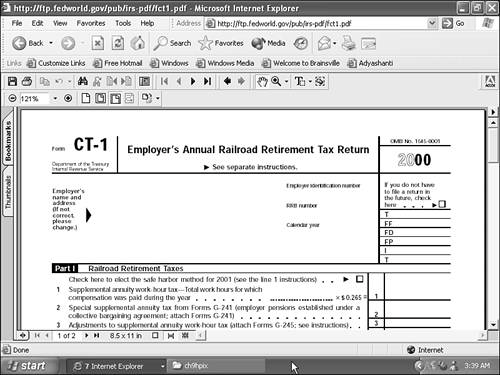Tips from the Windows Pros: Finding and Using PDF Documents on the World Wide Web
| Perhaps you saw the photograph on the cover of Time magazine a few years ago of Bill Gates in a forest, sitting atop a tree-sized stack of papers while holding a single compact disk in his hand, suggesting that digital information storage could save trees. It can, but it isn't easy. The problem with digital documents is that, even with the best available technology, they are still not as easy to read as a paper book. Computer monitors put considerably more strain on your eyes, and even laptop PCs can be too bulky or clumsy to carry with you to a comfortable reading location. Furthermore, current digital storage technologies have a shorter shelf life than paper. Most CDs begin to deteriorate and lose their data after 10 to 20 years, but properly stored paper can last for centuries. Still, digital documents have many advantages. First and foremost is cost: A single compact disc can contain hundreds of books yet cost less than $1 to manufacture. Printing the same amount of data on paper would cost hundreds, if not thousands, of dollars. Electronic books can be searched quickly, efficiently, and more thoroughly than printed ones. And, of course, digital documents are much easier to distribute. One of the most popular methods for producing and distributing electronic books online is via PDF (Portable Document Format) files. PDF documents can be read using the Adobe Acrobat Reader, a free program offered by Adobe Systems, Inc. (www.adobe.com). PDF books can have the appearance and properties of a paper book but without the paper. They also have the advantage of being compatible across many platforms, with versions of the Reader software available for Windows, Macintosh, OS/2, and various incarnations of Unix. A PDF document link on a Web page is usually identified by the PDF icon. PDF is used for a wide range of documents:
You can obtain the Acrobat Reader from many sources. If you own any other Adobe softwaresuch as Photoshop or PhotoDeluxethe reader is probably already installed on your computer. Look for a program group called Adobe or Adobe Acrobat in your Start menu. You can also download it for free from the Adobe Web site. Even if you find Adobe Acrobat on your computer, it's best to download the latest version of the Acrobat Reader. Later versions integrate nicely with Internet Explorer to read PDF documents directly over the Web, and include the Find feature. When you're choosing the version to download, click the box next to Include Option for Searching PDF Files and Accessibility Support. The file size is just a little larger, but the additional features are well worth it. Some features are dependent on the writer of the PDF file. For example, "bookmarks" only work with PDF documents that have been indexed. Acrobat Reader works as a plug-in for Internet Explorer. When you click a link for a PDF document, it opens Acrobat Reader within IE, but the tool bars and menu will change, as you can see in Figure 9.19. Just click the back button to bring you back to the Web page you were viewing. Figure 9.19. PDF files can be viewed within a Web page. It is not uncommon to have problems with this whole procedure, although it does run more smoothly with the latest version. If you have trouble reading PDF documents over the Web, first save the PDF document to your hard drive. Instead of clicking the PDF link to open the file in a browser, right-click it and choose Save Target As from the shortcut menu that appears. After saving the document to the location you choose, open it manually using Acrobat Reader outside the IE session. Saving the PDF document in this manner has the added advantage of making the document easily available to you for future reference, and available offline. |
EAN: 2147483647
Pages: 450